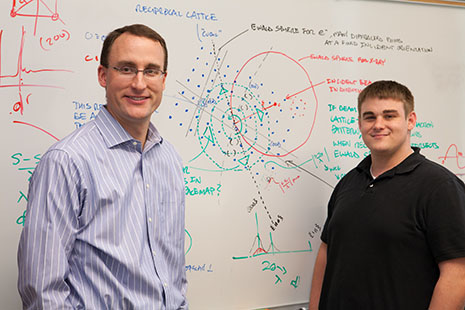
FAYETTEVILLE, Ark. – The white board in Douglas Spearot’s office in the Institute for Nanoscience and Engineering at the University of Arkansas is a symphony of green, red and black drawings and equations.
Spearot, an associate professor of mechanical engineering, and doctoral student Shawn Coleman are working to solve a computational problem in nanoscale material behavior. The work on the white board represents research they are conducting with the aid of supercomputers located in San Diego and Austin, Texas.
Their project was among three major awards of supercomputer time recently allocated to U of A researchers by the Extreme Science and Engineering Discovery Environment, a collection of facilities that scientists can use to interactively share computing resources, data and expertise. The collected facilities, known as XSEDE, are supported by the National Science Foundation and offer researchers access to a network of 16 supercomputers and high-end visualization and data analysis resources across the United States.
The awards to the U of A total 3.6 million “service units” on supercomputers at sites ranging from California to Tennessee. The units, equivalent to core computing hours, are worth approximately $288,000 based on estimates by the National Science Foundation and XSEDE, according to Jeff Pummill, manager of cyberinfrastructure enablement at the university’s Arkansas High Performance Computing Center. A core hour is the amount of work that would be done by just one central processing unit core in one hour's time.
The researchers don’t travel to the supercomputer sites; they connect to the supercomputers from their campuses and remotely submit jobs that often require hundreds of processors and hundreds of terabytes of memory. A terabyte is equal to 1 trillion bytes, or 1,000 gigabytes.
XSEDE, formerly known as TeraGrid, awarded several smaller supercomputing resource grants in the last three years to the U of A. The recent awards are the most substantial, Pummill said.
Rick McMullen, director of the Arkansas High Performance Computing Center, said the center’s mission is to meet the computational needs of the U of A community, either on campus or with supercomputers at other sites.
“The National Science Foundation has a meticulous process of peer-review for this type of XSEDE award, so it’s significant to get this kind of time,” McMullen said.
In addition to Spearot and Coleman, Douglas Rhoads, professor of biological sciences, and Xuan Shi, an assistant professor of geosciences, received awards of supercomputer time.
Spearot said calculations performed at the high performance computing center provided feasibility results that strengthened the proposal he and Coleman submitted to XSEDE. Coleman is attending the university on a Doctoral Academy Fellowship.
“The computer time awarded will allow Shawn to perform atomistic simulations critical to his dissertation that are too computational and memory-intensive to be performed on local resources,” Spearot said.
Shi was awarded time at supercomputers at the National Institute for Computational Sciences in Oak Ridge, Tenn., to accelerate computations centering on crime data and urban sprawl simulations.
Rhoads is working with Pummill on assembling the complete genome for the timber rattlesnake. A better understanding of the reptile genome has implications for human health, among other things. They were awarded time on supercomputers in San Diego, Austin and Pittsburgh.
The Arkansas High Performance Computing Center helped prepare the supercomputer time-grant proposals.
Topics
Contacts
Rick McMullen, director
Arkansas High Performance Computing Center
479-575-8681, dfmcmull@uark.edu
Douglas Spearot, associate professor and 21st Century Professor
College of Engineering
479-575-3040, dspearot@uark.edu
Chris Branam, research communications writer/editor
University of Relations
479-575-4737, cwbranam@uark.edu